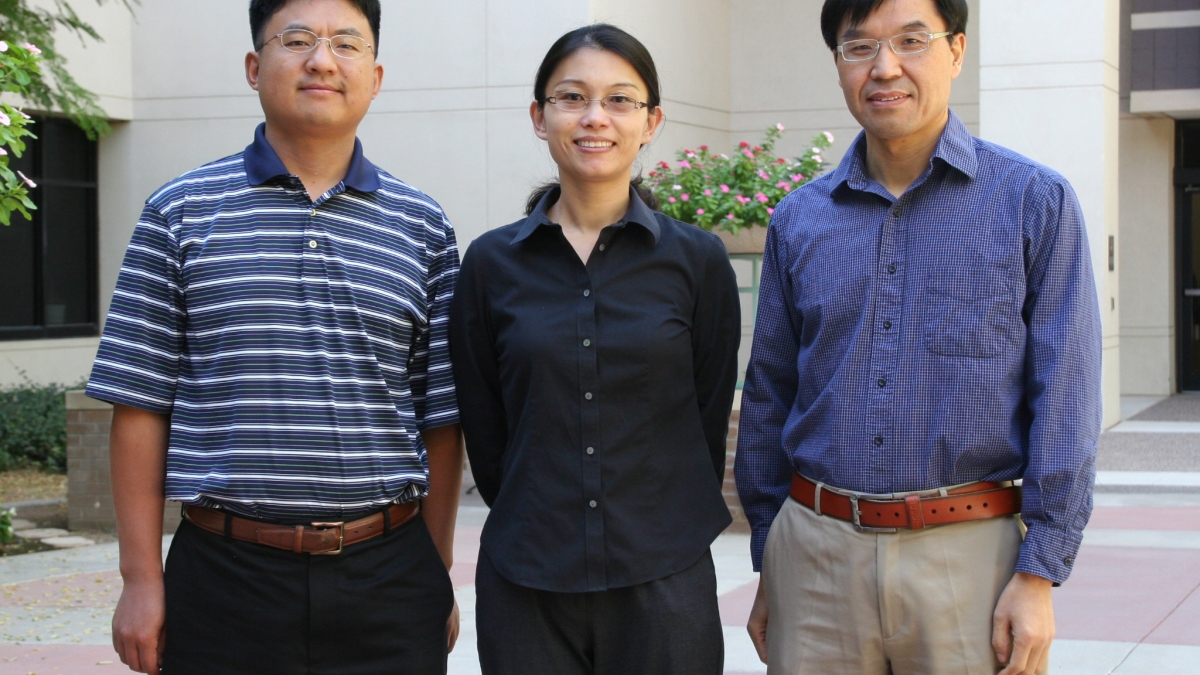Social network info flow explored in NSF-funded study

How does a piece of information – anything from breaking news to a negative review of a new movie – spread over time and space in an online social network? That’s the key question being examined by three faculty members in ASU’s New College of Interdisciplinary Arts and Sciences, the core college on the West campus.
Computer scientists Feng Wang and Kuai Xu, along with mathematician Haiyan Wang, received a three-year, $250,000 research award from the National Science Foundation for their project “Dynamic Mathematical Modeling Towards Understanding Information Diffusion in Online Social Networks.” The three are among the faculty of New College’s School of Mathematical and Natural Sciences (MNS).
“Our ultimate goal is to gain an improved understanding on the diffusion process of information spreading over social networks and to characterize the speed and coverage of a piece of information traveling across these networks,” said Feng Wang, the principal investigator for the grant project.
“Online social networks have played a growing important role in our society, and it becomes increasingly urgent to understand the diffusion process of information over social networks,” said co-principal investigator Haiyan Wang. “By introducing distance metrics for online social networks, we are able to use partial differential equations to characterize the speed and coverage of a piece of information traveling across these networks in both temporal and spatial dimensions. The innovative approach opens a new door for studying information diffusion in online social networks.”
The research being conducted by the three faculty members is highly significant because it is at the cutting edge of exploring the new field of online social networks, said Roger Berger, director of MNS. “This research also embodies New College’s focus on interdisciplinarity, spanning both computer science and mathematics,” he said.
The researchers are striving to combine advances in data mining and graph theory with efforts in dynamic mathematical modeling to characterize and predict the time and space dynamics of information diffusion in online social networks.
“The dynamic mathematical modeling approach in our study represents a paradigm shift from statistical analysis and optimization algorithms design to a focus on understanding and modeling information diffusion in online social networks,” Feng Wang explained.
The project consists of four major components that build upon each other. The researchers aim to define and evaluate new distance metrics to capture information diffusion process, classify the vast amount of information into clusters, design dynamic mathematical models to characterize and predict time-space information diffusion, and extend the proposed model to understand more complex interactions, such as information initiated from multiple sources and competing news.
“We anticipate that this research will produce an extendable theoretical framework for characterizing, modeling and predicting the diffusion process of information and new algorithms for classifying the sheer volume of information in social networks,” said co-principal investigator Kuai Xu.
Undergraduate students in the MNS degree programs in applied computing and applied mathematics will be involved in working on the grant project. “This is an opportunity for students to gain valuable research experiences in mathematical modeling, graph theory and large-scale data collection and analysis, and to prepare students for the challenges and opportunities in the increasingly important field of online social networks,” said Feng Wang.
She and her colleagues are hopeful the project will result in a deeper understanding of information diffusion, disclose more details about interpersonal interaction, and help validate optimization algorithms aimed at identifying influential individuals. The increased understanding of information diffusion in social networks also could facilitate the spreading of positive information and limit the distribution of spam and phishing messages.
“Receipt of an NSF grant is important national recognition of the research being conducted by three of our faculty members,” Berger said. “This research, although just in its initial stages, has already been recognized at an international meeting.”
Feng Wang made a presentation about the project at the International Workshop on Hot Topics in Peer-to-Peer Computing and Online Social Networking in Macau, China last summer, earning the best paper runner-up award at the workshop. She also spoke at Peking University and Hong Kong City University. Haiyan Wang also gave a number of talks about the project at universities and institutes in Canada and China.
The New College Bachelor of Science in applied computing focuses on the creation, use, dissemination and administration of information to users in government, non-profit, academic, business, library and other settings through the merger of technical and other approaches. The applied computing curriculum emphasizes the selection, evaluation, description, storage, retrieval, manipulation and presentation of information in all its forms, including text, image, sound and numbers.
The Bachelor of Science in applied mathematics prepares graduates for work with natural and social scientists and engineers. The curriculum includes both theoretical and applied mathematics, as well as a solid foundation in computing and statistics. It includes training in many types of mathematical modeling and numerical methods, as well as significant education in the use of common mathematical software.